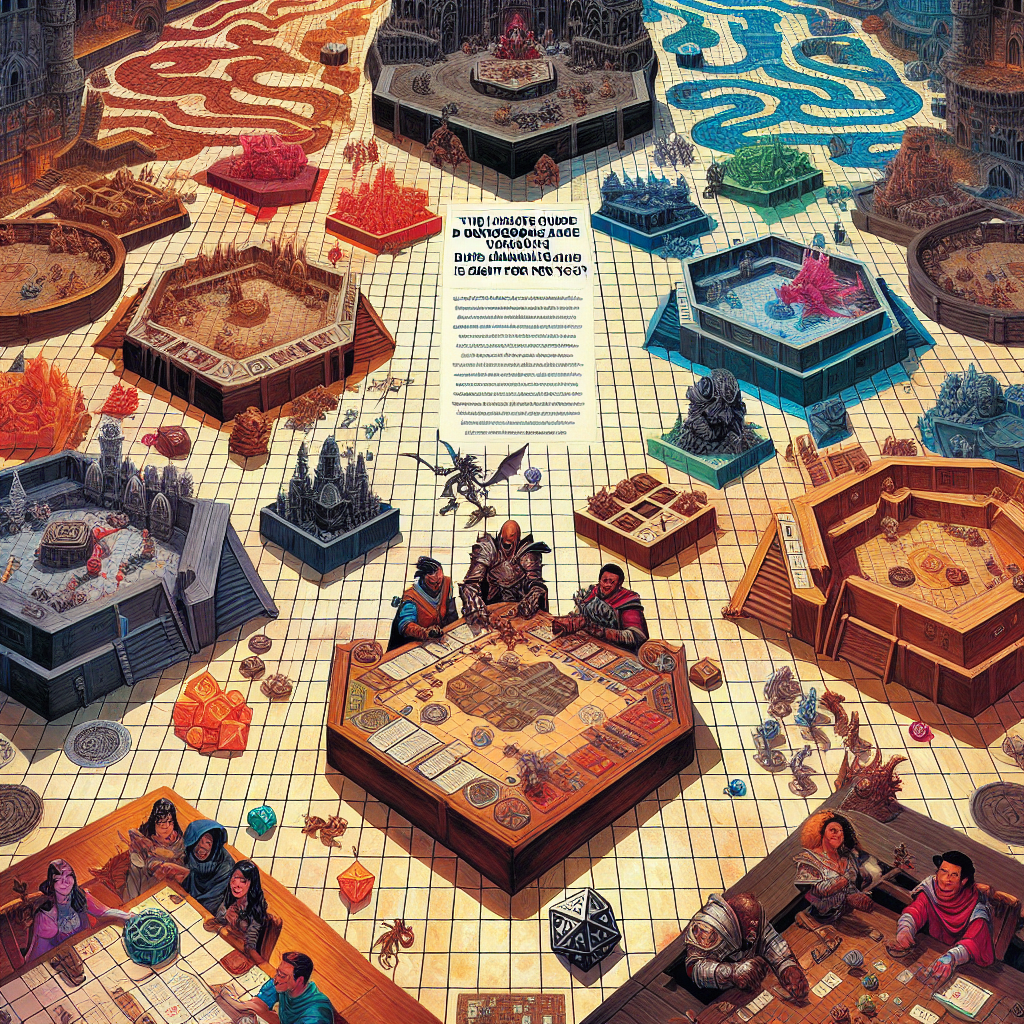The Ultimate Guide to Dungeons and Dragons Variants: Which Board Game is Right for You?
When it comes to tabletop role-playing games, few names resonate more than Dungeons & Dragons (D&D). Since its inception in the 1970s, D&D has grown into a vast ecosystem of rulebooks, campaign settings, and, perhaps most importantly, variants and adaptations. Whether you’re an experienced Dungeon Master or a newcomer to the world of TTRPGs, understanding the various D&D variants can enhance your gaming experience and help you find the perfect fit for your group’s style. In this ultimate guide, we will explore different Dungeons & Dragons variants to help you determine which game is right for you.
The Core Game: Dungeons & Dragons 5th Edition
Before diving into the variants, it’s essential to acknowledge the core of the D&D experience: the 5th Edition (5E). The 5E ruleset is accessible, balancing complexity and ease of play, making it great for newcomers and experienced players alike. It emphasizes storytelling, character development, and player creativity, allowing for endless possibilities.
Pros:
- Balances simplicity and depth
- Supports a vast world of house rules
- Extensive supplemental materials available
Cons:
- Might feel too generic for some veteran players
- Certain mechanics can be underdeveloped or imbalanced
Variant 1: Dungeon World
For those who yearn for a narrative-driven experience, Dungeon World could be your ideal D&D variant. This Powered by the Apocalypse game streamlines mechanics, focusing on storytelling and character-driven actions instead of complex rules.
Key Features:
- Emphasis on collaborative storytelling
- Simple mechanics that encourage creative problem-solving
- Players directly influence the world
Pros:
- Great for improv and spontaneous creativity
- Fast-paced and easy to learn
Cons:
- Less focus on tactical combat
- Some players might miss the depth of character progression
Variant 2: Pathfinder
If your group prefers a more complex system, Pathfinder could be the way to go. Originally a response to 3.5 Edition D&D, Pathfinder has generated its own robust rule system that significantly expands on character classes, race options, and customization.
Key Features:
- Detailed character creation and advancement
- Deep and intricate system of rules for combat and magic
- Extensive lore and world-building
Pros:
- Offers numerous options for character customization
- Strong tactical combat mechanics
Cons:
- Can be overwhelming for new players
- Game sessions may run longer due to complexity
Variant 3: The One Ring RPG
For fans of J.R.R. Tolkien’s Middle-earth, The One Ring RPG provides a rich and immersive experience focused on the themes of adventure, heroism, and the struggle against evil. This RPG emphasizes narrative and collaboration while capturing the feel of epic quests familiar from the novels.
Key Features:
- Unique mechanics inspired by Tolkien’s works
- Emphasis on fellowship and communal goals
- Mood-setting mechanics that enhance tension and storytelling
Pros:
- Perfect for fans of the source material
- Immersive storytelling experience
Cons:
- Limited to the themes and settings of Tolkien’s work
- Not as flexible for traditional D&D gameplay styles
Variant 4: Savage Worlds
If your group thrives on versatility and fast-paced action, Savage Worlds introduces a system that accommodates various genres, including fantasy, science fiction, and horror. This system is known for its “Fast! Furious! Fun!” approach.
Key Features:
- Modular rules allow for easy adaptation to various settings
- Dynamic combat mechanics that speed up gameplay
- Simple character creation
Pros:
- Perfect for one-shots or short campaigns
- High-energy play with quick resolution
Cons:
- May lack the depth desired for longer campaigns
- Requires some adaptation for fantasy settings
Variant 5: Lamentations of the Flame Princess
For those who enjoy the darker sides of fantasy RPGs, Lamentations of the Flame Princess leans heavily into horror and gritty adventures. Its retro roots harken back to earlier versions of D&D, focusing on exploration, survival, and true danger.
Key Features:
- Emphasis on character mortality and consequence
- Simplified rules for accessibility
- Dark, atmospheric adventures
Pros:
- Offers a refreshing take on the fantasy genre
- Engages players in high-stakes scenarios
Cons:
- Dark themes may not be suitable for all groups
- Less focus on character development than other variants
Making Your Choice
Choosing the right Dungeons & Dragons variant depends on your group’s preferences, playstyle, and the kind of storytelling you want to engage in. Ask yourself the following questions:
-
What kind of story do we want to tell? — Consider whether your group prefers a narrative-driven approach or a tactical game.
-
How complex do we want our rules? — Gauge your players’ willingness to engage with intricate systems. Will they embrace the challenge, or seek a casual experience?
-
What themes resonate with our group? — Fantasy, horror, sci-fi, or a blend of genres can guide your choice of variant.
- How long are our sessions? — Consider whether you prefer longer campaigns or quick, one-off adventures.
Conclusion
Exploring the various Dungeons & Dragons variants can feel like a treasure trove of potential adventures. Each variant brings its unique flavor and mechanics to the table, providing many options to mold your gaming experience. Whether you gravitate towards narrative-heavy gameplay or complex combat mechanics, you’re bound to find a perfect match within the D&D universe. So gather your friends, choose your variant, and embark on an unforgettable adventure!




